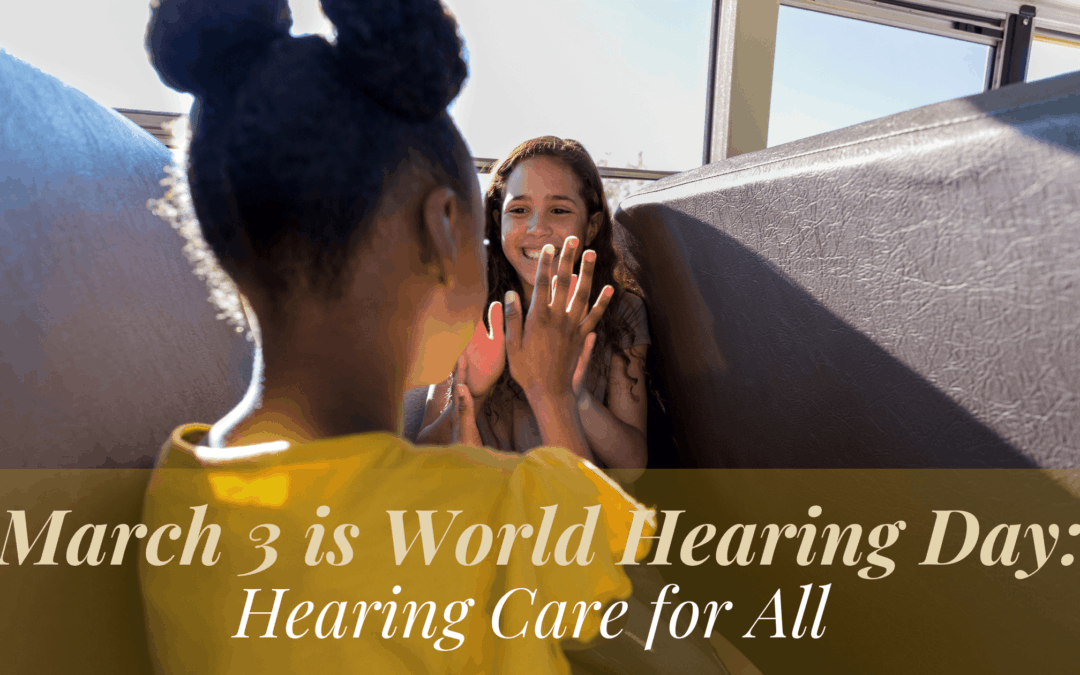Launched by the World Health Organization (WHO), World Hearing Day is the largest global campaign that centers hearing health. This campaign is a call to action that focuses on raising awareness of the public health epidemic that is hearing loss and ways to practice hearing care. Hearing loss is one of the most common, chronic medical conditions that people experience.
According to WHO, 466 million people around the world live with disabling hearing loss. This number is expected to rapidly increase which is why World Hearing Day advocates for early intervention, education, and effective public health policy. It is important to understand the scope of hearing loss and ways you can prioritize your hearing health!
World Hearing Day: Screen, Rehabilitate, Communicate
The theme of this year’s World Hearing Day is hearing care for all, emphasizing three key strategies:
- Screen: hearing loss, though one of the most pervasive medical conditions, is also commonly underdiagnosed. Two factors that contribute to its underdiagnosis is that it typically happens gradually which means that it takes quite some time to notice and it is also difficult for people to acknowledge changes to their health. Additionally, people are often unaware that hearing loss is a permanent and serious medical condition that needs immediate treatment. The best way to address this is by having your hearing screened regularly. Hearing tests should be integrated into yearly health check-ups so that you can remain aware of your hearing needs and intervene if and when there are changes.
- Rehabilitate: hearing loss cannot be cured but there are effective treatment options that maximize hearing, allowing people to manage the condition with ease. The most common treatment is hearing aids which are electronic devices that are designed to absorb, amplify, and process sound. This support can significantly increase one’s hearing ability which has countless benefits on overall health and wellness.
- Communicate: a major benefit of treatment is strengthened communication. Hearing aids alleviate the symptoms hearing loss produces, making it easier to hear and engage in conversations. Effective communication is essential for healthy relationships, managing professional responsibilities, social life etc.
In addition to these important aspects, World Hearing Day also advocates for hearing health advancements on a policy level; specifically calling on policy makers to:
- integrate hearing health care within national health plans
- invest in cost effective interventions
Greater accessibility to hearing healthcare is critical for hearing loss prevention and promoting hearing health.
Understanding Hearing Loss
There are several factors that can contribute to the development of hearing loss including: environmental exposure to loud noise, existing medical conditions, aging, head or neck injuries, and genetic history. There are three types of hearing loss:
- sensorineural: describes damage in the inner ear or auditory pathways leading to the brain
- conductive: refers to obstruction in the outer or middle ear which prevents sound from reaching the inner ear
- mixed: combination of sensorineural and conductive hearing loss
The most common type of hearing loss is sensorineural which accounts for 90% of all hearing loss cases. This form of hearing loss most often results from damaged hair cells in the inner ear. These hair cells help translate soundwaves into electrical signals that are then sent to the brain to be further processed – enabling us to understand what we hear. There are thousands of hair cells in the inner ear which unlike other types of cells, do not regenerate. This means that when they lose sensitivity and/or die, this damage is permanent as there are no medical treatments that can replenish these tiny hair cells. Hearing loss results in a reduced ability to hear and process incoming sound information, producing a range of effects that can take a toll on all aspects of life.
Prioritize Hearing Health
There are numerous ways to prioritize your hearing health and reduce your risk of developing hearing loss including:
- reduce your exposure to loud noise by avoiding loud environments, wearing protective gear (earplugs, headphones, earmuffs etc.), maintaining low volume settings on electronic devices
- take listening breaks to allow your auditory system to rest from constantly absorbing and processing sound
- have your hearing tested regularly!
When it comes to prioritizing hearing health, we’re here to help! Contact us today to schedule a hearing test or to learn more about our comprehensive hearing health services.

